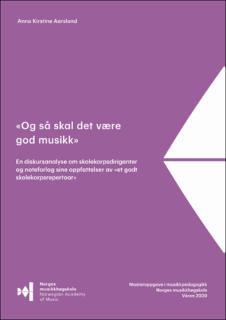"Og så skal det være god musikk". En diskursanalyse om skolekorpsdirigenter og noteforlag sine oppfattelser av "et godt skolekorpsrepertoar"
Master thesis
Permanent lenke
https://hdl.handle.net/11250/2687147Utgivelsesdato
2020Metadata
Vis full innførselSamlinger
- Masteroppgaver [283]
Sammendrag
Sammendrag -
Denne oppgaven har fokus på repertoaret i norske skolekorps. Bak en konsert står det ofte en dirigent som har valgt ut musikken som spilles, men hvilke valg tar en dirigent når det jobbes med repertoar? Hvem tar de hensyn til og hva fokuseres på? Med tanke på hvor ulike konserter skolekorpsene spiller, kan det se ut som dirigentene har ulike oppfattelser av hva som er et godt skolekorpsrepertoar. Korpsbevegelsen har en tradisjon for å jobbe mest med notebasert musikk. De fleste dirigenter forholder seg derfor til ferdige, notebaserte arrangementer og originalmusikk fra noteforlag. Derfor var jeg også nysgjerrig på hva et noteforlag tenker når de jobber med repertoar. Ved å intervjue seks dirigenter og Norsk Noteservice, har jeg forsøkt å finne ut hva som blir oppfattet som et godt skolekorpsrepertoar, og hvordan dette regulerer det didaktiske arbeidet med repertoar.
Studiens teorigrunnlag har bestått av Laclau og Mouffe sin diskursteori og didaktisk teori i form av den didaktiske relasjonsmodellen. Studien har vært metodisk forankret i kvalitativ forskning og diskursteori, og datainnsamlingen ble gjennomført ved hjelp av semistrukturerte intervju med seks skolekorpsdirigenter fra NMF-regionene Hordaland, Rogaland og Øst samt ett noteforlag.
Analysen avdekket ni ulike diskurser som forsøker å fylle «et godt skolekorps repertoar» med innhold. Disse diskursene var 1) bred musikkutdanning, 2) norsk musikk, 3) målgruppe, 4) dirigentens kompetanse, 5) godt håndverk, 6) den bevisste og selvstendige musikanten, 7) musikk for skolekorpsets besetningen, 8) mestring og utvikling og 9) musikantenes påvirkning.
Funnene i denne studien peker blant annet på at et godt skolekorpsrepertoar er tilpasset musikantene, tar hensyn til korpsets besetning og gjenspeiler dirigentenes kompetanse innen sjangere, stiler, epoker, metoder og arrangering/komponering. Summary -
This study focuses on the repertoire in Norwegian youth bands. A concert program is often put together by the musical directors, but what choices does the conductor make when finding repertoire? What is being looked after and what needs focus? Considering the variation in programming for a youth band, it seems like the conductors have varied opinions on what they believe to be a good youth band programme. The banding movement has a tradition of playing written music, and the conductors mostly kept to playing note based arrangements and original music from the music publishers. That spiked my curiosity as of what the music publishers has in mind when working with repertoire. By conducting interviews with six musical directors and Norsk Noteservice (a Norwegian music publisher), I try to see what a good youth band repertoire looks like and how this regulates the didactic work of repertoire.
The theoretical framework has consisted of the discourse theory from Laclau and Mouffe and in the form of the didactic relation model. The research methodology employs qualitative research and the discourse theory, and the data collecting consisted of semi structured interviews with six youth band conductors from the NMF regions Hordaland, Rogaland and Øst, with the addition of one music publisher.
The analysis revealed nine different discourses that tried to fill «a good youth band repertoire» with content. These discourses were 1) a broad music education, 2) Norwegian music, 3) target group, 4) the conductors competence, 5) good music crafting, 6) the conscious and independent music student, 7) music for the bands line up, 8) mastering and development and 9) the influence from the music students.
The results of this study indicates that a good school band repertoire is adjusted to the music students, considers the bands line up and reflects the competence of the music conductor within genres, styles, period music, methods and arranging/composing.
Beskrivelse
Norges musikkhøgskole. Masteroppgave. Musikkpedagogikk
